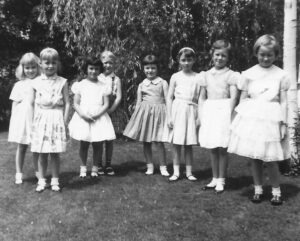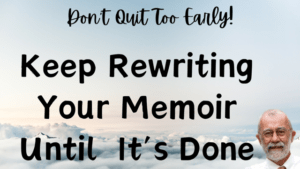It was 2016, and I was in what I thought of as the very last days of the memoir writing process and polishing A Sugary Frosting / A Memoir of a Girlhood Spent in a Parsonage, the early lifestory of my deceased spouse, Martha Blowen. It was a time to make sure I had written what I wanted to write and to check grammar and spelling before it went out to a copy editor.
I had promised Martha that I would write her stories so that our grandchildren would know something about her. In May 2015, I began gathering the stories she had written of her life. My intent was to create a booklet of these stories. But, to be honest, it has never appealed to me to write booklets. I like to write books. That’s what I do and that’s what I do well.

As I read through Martha’s stories, in a few instances, I understood that some were fragmentary and needed filling out. I knew the story she was trying to convey but then I had lived with her for 31 years. Would someone who did not know her—our grandchildren, for instance—understand and appreciate the tale? So, I tweaked the stories to make them more complete, more meaningful. Good work, I thought.
Then there were all the other stories that she had not written that I knew to be important to her and that I felt our grandchildren would want to know. I had heard Martha’s stories many, many times and so it was not hard for me to write them. Soon I had composed more stories than Martha had left behind. Well, why not write these down, too—so I wrote them.
Now the stories were adding up to a life, to a memoir.
Going Deeper into the Writing Process
As I am always urging anyone who works with me whether in coaching, in editing, or in ghostwriting, I created a memory list. This is a list of any and all memories related to a topic. It is both a fantastic recall exercise and an organizer for a memoir.
As you can imagine, A Sugary Frosting / A Memoir of a Girlhood Spent in a Parsonage inevitably began to grow and grow. Soon it was well beyond the booklet stage. I continued writing, realizing I was creating a full-length memoir. As I wrote, there arose the standard question of where does the memoir end, where does this memoir of Martha’s early life come to an end. There was a natural curve to her story – and that was the life she had spent with her parents in the parsonage. After that, she lived a different life energy. (I write about life phases on my blog and why they are so important in memoir writing.)
In the polishing part of the memoir writing process, I identified two facets as interesting in the story. One was that it portrayed the story of a subculture in America in the 50s, 60s, and early 70s—in this instance, life in an Anglo-Protestant parsonage. A Sugary Frosting / A Memoir of a Girlhood Spent in a Parsonage was also a necessary prelude to a book that I wanted to publish in the next year or two. This book, which was composed of collations of Martha’s and my journals, would be about the two years after Martha had been stricken with intraductal breast cancer and during which it progressed through her body. These journals were full of her illness, her resistance, and her time of acceptance. This was, of course, my time, too, of resistance and acceptance.
Martha died on August 18, 2008. There was a long time during which I was unable to write about her. Eventually, however, after a couple of years, I was able to resume the memoir writing process but on different book. This one was the one that sprouted from her journals and her stories. I created a book from the two journals she and I had kept.
My original intent had been to make these two journal books my next publishing project. But when I thought about it, I felt these journal manuscripts had something missing. What was missing, I believe, was a large historical context – “historical” meaning her earlier life: what context did she come out of? What influences had marked her for life?
That questioning led to re-igniting A Sugary Frosting and I set to work on it again. This time I finished it. A Sugary Frosting was published in both hard copy and e-version on March 30, 2016.
Here is a free memoir-writing e-course which I have curated just for you:
~ Faulty Process is—Well—Useless
~ Don’t Waste Your Memoir-Writing Time
~ A Pillar for More and Better Writing
~ Writing When You Don’t Feel Like Writing
~ Today’s Video: Stick with the process. Success demands it.
Good luck with your writing and remember to write a bit on your memoir today.
And remember: “Inch by inch, it’s a cinch; yard by yard, it’s hard.”
Good luck writing your stories!
Keep writing. Manage your time well. Your memoir is important.
Best,
Denis and The Memoir Network Team



No comments yet.